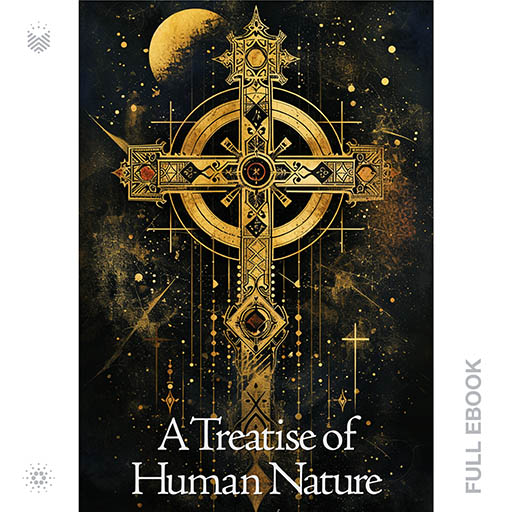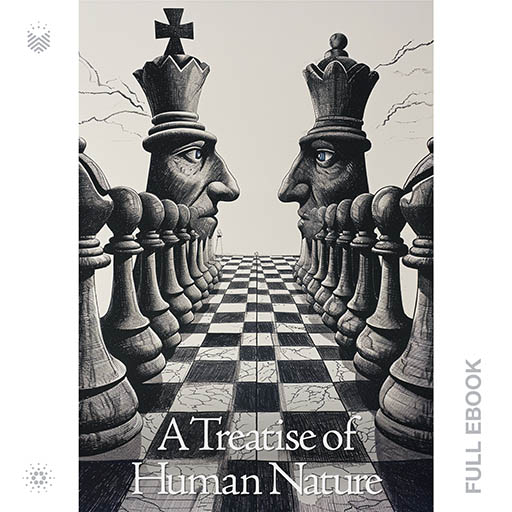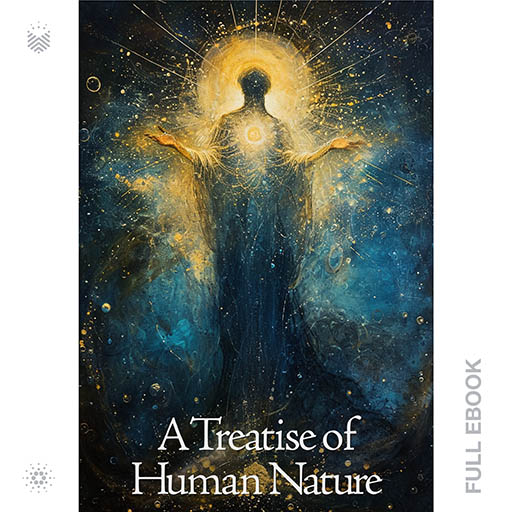Home » Books » A Treatise of Human Nature
A Treatise of Human Nature
Being an Attempt to Introduce the Experimental Method of Reasoning into Moral Subjects
Sold Out - Available On:
jpg.store“A Treatise of Human Nature” is a philosophical work by the Scottish philosopher David Hume, first published in three volumes in 1739 and 1740. Hume is widely regarded as one of the most important figures in Western philosophy and a key figure in the Scottish Enlightenment.
Description
The treatise is divided into three books:
- Book I: “Of the Understanding”
- Hume begins by exploring the nature of ideas and impressions. He argues that all our mental content can be categorized as either impressions, which are more vivid and forceful, or ideas, which are fainter copies of impressions.
- Hume also discusses the principles of association, such as resemblance, contiguity, and cause and effect, which he believes govern the way our ideas are connected in the mind.
- Book II: “Of the Passions”
- In this book, Hume investigates human emotions and sentiments, which he refers to as “passions.” He analyzes various emotions, including love, hate, pride, humility, and others, examining their origins and the role they play in human psychology.
- Book III: “Of Morals”
- The third book focuses on moral philosophy. Hume explores the nature of moral distinctions and the foundations of ethics. He argues against the existence of innate moral ideas, asserting that moral judgments are based on sentiment and emotional responses rather than reason alone.
- Hume is famously known for his discussion of the “is-ought problem,” suggesting that it is logically fallacious to derive normative statements (what ought to be) from purely descriptive statements (what is).
While “A Treatise of Human Nature” did not achieve immediate success upon its initial publication, it has since become a classic in the history of philosophy. Hume’s empirical and skeptical approach to understanding human nature and his contributions to epistemology, metaphysics, and ethics have had a profound influence on subsequent philosophical thought.
Numbered eBooks: 250
Number of Unique Covers: 16
Number of 1:1 Covers: 10

David Hume
1 Unique Designs
x 70 Numbered eBooks
= 70 NFT eBooks
eBook Numbers 180 - 249
(28.00% of Supply)

The Skepticism of Human Knowledge
1 Unique Designs
x 60 Numbered eBooks
= 60 NFT eBooks
eBook Numbers 120 - 179
(24.00% of Supply)

Of Miracles
1 Unique Designs
x 50 Numbered eBooks
= 50 NFT eBooks
eBook Numbers 70 - 119
(20.00% of Supply)

Of the Understanding
1 Unique Designs
x 30 Numbered eBooks
= 30 NFT eBooks
eBook Numbers 40 - 69
(12.00% of Supply)

Of Morals
1 Unique Designs
x 20 Numbered eBooks
= 20 NFT eBooks
eBook Numbers 20 - 39
(8.00% of Supply)

The Perception of the Human Mind
1 Unique Designs
x 10 Numbered eBooks
= 10 NFT eBooks
eBook Numbers 10 - 19
(4.00% of Supply)

The Bundle Theory of Self Reflection
4 Unique Designs
x 1 Numbered eBooks
= 4 NFT eBooks
eBook Numbers 6 - 9
(1.60% of Supply)

The Association of Ideas
3 Unique Designs
x 1 Numbered eBooks
= 3 NFT eBooks
eBook Numbers 3 - 5
(1.20% of Supply)

Finding God in an Orderly Universe
2 Unique Designs
x 1 Numbered eBooks
= 2 NFT eBooks
eBook Numbers 1 - 2
(0.80% of Supply)

Of the Passions
1 Unique Designs
x 1 Numbered eBooks
= 1 NFT eBooks
eBook Numbers 0 - 0
(0.40% of Supply)
Details
Publisher : Book.io
Series : Monday Meditations
First Publication Date : 1739
Author : David Hume
Genres: Non-Fiction, Philosophy, Psychology, Religion, Treatise
Language : English
Word Count : 175,000
Format : DEA (Decentralized Encrypted Asset)
Read On : Book.io eReader dApp
Cover Art : Includes 4K hi-resolution book cover
Cardano Retail Price : 299 ADA
Cardano Discount Price : 149 ADA, for wallet holding Meditations and Thus Spake Zarathustra
Purchase Limit: 1
Cardano Policy ID : ecef2a98145b0d69e8ed2b090df6496d4a0ecf08af1fd5b7bfc9ea96
Author Info

David Hume
David Hume (1711–1776) was a Scottish philosopher, historian, economist, and essayist, and he is widely regarded as one of the most important figures in Western philosophy.
Hume's most significant work is "A Treatise of Human Nature," published in three volumes between 1739 and 1740. In this work, he explored topics such as the nature of human understanding, emotions, and morality. While the "Treatise" did not gain immediate popularity, it has since become highly i… Read More
You might also like
by Marcus Aurelius
A special edition release only for cNFTCon attendees. Meditations is a series of personal writings by Marcus Aurelius, Roman Emperor from AD 161 to 180, recording his private notes to himself and ideas on Stoic philosophy.
Read More
by Friedrich Nietzsche
“Thus Spake Zarathustra” translated from “Thus Spoke Zarathustra” is a philosophical novel written by the German philosopher Friedrich Nietzsche, published in four parts between 1883 and 1885. It is written in the form of a prose poem and is considered one of Nietzsche’s most significant and challenging works.
Read More
by Plato
“The Republic” is a philosophical dialogue written by the ancient Greek philosopher Plato. It is one of his best-known works and is widely considered a classic of Western philosophy. In the dialogue, Plato explores the nature of justice and the ideal state through a discussion between Socrates and several other characters.
Read More
by Henry David Thoreau
“Walden or Life in the Woods” is a book written by American transcendentalist author Henry David Thoreau. It was first published in 1854 and is a reflection on simple living in natural surroundings. The book is part personal declaration of independence, social experiment, voyage of spiritual discovery, satire, and manual for self-reliance.
Thoreau wrote “Walden” during a two-year period when he lived in a cabin he built near Walden Pond, located in Concord, Massachusetts. The book docume… Read More







